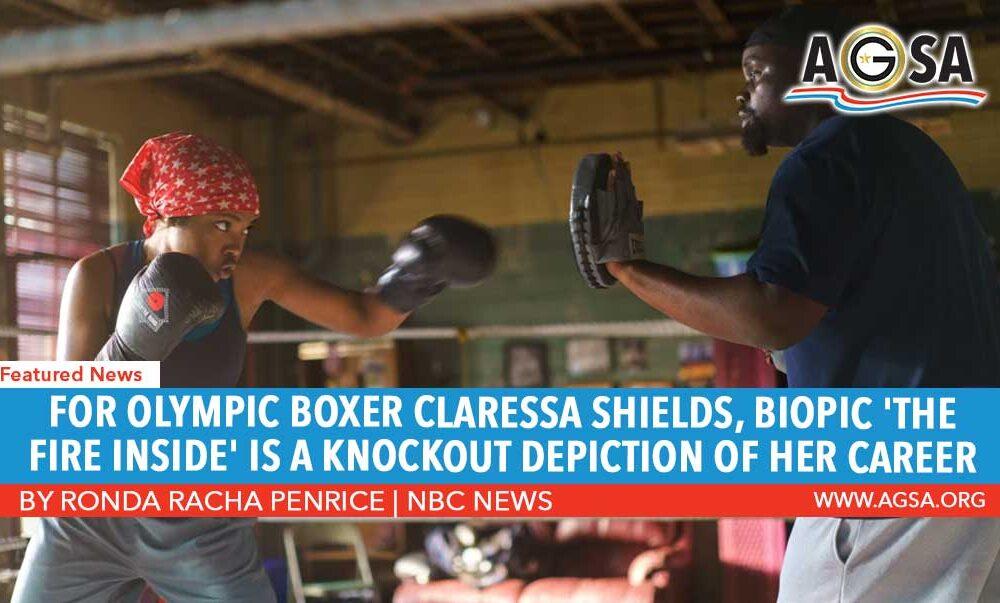
By Ronda Racha Penrice | NBC News
To boxing and Olympics enthusiasts, Claressa “T-Rex” Shields is a household name. The film “The Fire Inside,” starring Ryan Destiny as Shields and Brian Tyree Henry as her trainer, Jason Crutchfield, now aims to bring the 29-year-old phenomenon’s story into every household and the world.
Written by Oscar-winning “Moonlight” filmmaker Barry Jenkins and directed by Oscar-nominated cinematographer Rachel Morrison, who worked on “Black Panther,” “The Fire Inside” traces Shields’ boxing journey starting at age 11, concentrating on her teen years working with volunteer boxing coach Jason Crutchfield, through her historic 2012 Olympics win at 17 and its aftermath, which included numerous titles and her second Olympic gold in 2016.
As a young Black girl growing up in Flint, Michigan, in a struggling household where she and her siblings often went hungry, Shields’ rise to become the first female boxer to win an Olympic gold medal for the United States was not exactly in the cards.
And casting Destiny for the lead role was unconventional, too, as she had started her career as a singer in girl groups before co-starring in the Lee Daniels’ TV series “Star,” about an aspiring girl group.
“For a long time, I had been wanting to do a project that really challenged me in a different way. With a project like this, it wasn’t something that specifically came to me,” the actor said.
In fact, to score this role, Destiny said she truly had to earn it.
Beyond the long audition process, the physical transformation into a believable, Olympic boxer took “months and months of training with a boxing trainer who was incredible and treated me like a fighter and not an actor,” she said. “And I think that really put me in the mindset more of an actual boxer in understanding the craft and the sport.”
Then there was the work of embodying Shields as a person. A 2015 documentary about Shields, “T-Rex,” provided the actor “a front-row seat” to Shields’ life, her relationship with Crutchfield and her journey to the Olympics.
“I studied it really hard to try to learn a lot of things — her mannerisms, the way she would talk, the way she would walk, the way she would fight, the way she would interact with her mom, interact with her siblings — and I think it really, really helped me,” Destiny said.
Shields herself told NBC News she was impressed by Destiny’s portrayal. “I’m happy she understood the calling and understood her role and who she was in the film,” Shields said. “I’m happy that she was able to include that confidence, show that grit.”
TSA reveals craziest confiscations of 2024, from snakes in pants to meth in crutches
Shields said she was impressed by Destiny and Brian Tyree Henry’s portrayal of her relationship with Crutchfield. “They got the relationship between me and Jason right,” she said. “Jason was like my best friend, mentor, my coach, my dad, and they were able to exude all of that in the film.”
Shining a spotlight on coaches like Crutchfield and many other Black men like him in other urban communities was critical to Jenkins, who once was a high school and college athlete.
“I felt like it was a story that I hadn’t seen told very often, even though I had seen that story in my everyday life,” Jenkins, who also directed “Mufasa,” told NBC News.
“Where I’m from in Miami, there are all these athletes being raised in some ways by these coaches who themselves are just working-class, working poor, the same way these athletes are,” he continued. “There’s this really great sacrifice that’s constantly happening with all of these communities all over America.”
Shields wanted Jenkins to hit several key points in his script when they initially met, prior to the release of his Oscar-winning 2016 film “Moonlight,” she said.
“Boxing is very physical, but I wanted him to catch the mental part,” Shields said. “And I wanted him to also not leave out the part that I believe in God.”
She also emphasized to Jenkins how she wanted the film to correct one critical depiction of her in the media. “People have written so many articles about me being an angry Black woman, but I let him know how I’m not angry to be a boxer. I love boxing. I’m passionate about it,” she said.
And she also did not want to be portrayed as a victim. “I wanted my hard times to show,” Shields said. “I wanted [people] to see what I went through, but I don’t want nobody feeling sorry for me.”